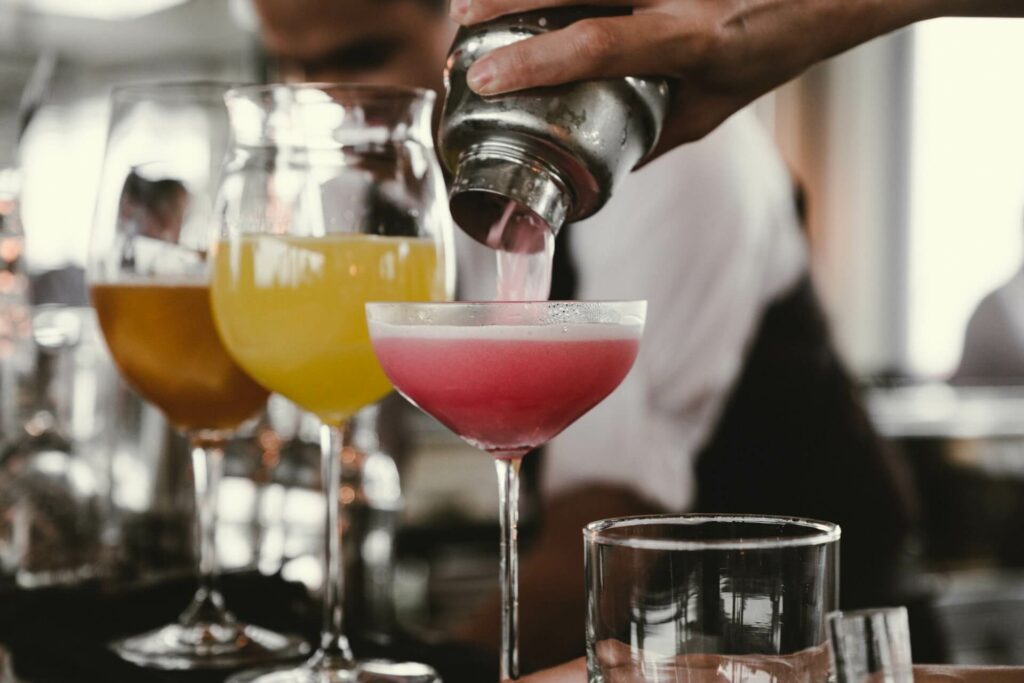As a bartender, one of the most important skills I’ve had to develop is the ability to memorize drinks.
With hundreds of different cocktails and beers on the menu, it can be a daunting task to remember each one and their respective ingredients.
But with patience and practice, as well as some helpful techniques, it’s possible to become a master at memorizing drinks.
In today’s post, I’ll break down some effective strategies I’ve used to memorize hundreds of drinks, making serving customers a breeze no matter what they order.
Let’s get to it…
Why Do Bartenders Need To Memorize Drinks?
Memorizing drinks is a VERY important part of any bartender’s role, and it serves several purposes.
Firstly, it allows bartenders to work efficiently and quickly. When a customer orders a drink, the bartender should be able to make it without having to look up the recipe.
This ensures that the customer does not have to wait for an extended period, and it enables the bartender to serve more customers in a shorter amount of time.
Memorizing drinks also helps bartenders to provide excellent customer service. When bartenders know the ingredients of a drink, they can make recommendations and suggest alternatives based on the customer’s preferences.
This helps to create a personalized experience for the customer, which can lead to increased tips and repeat business.
Not only that but knowing drink recipes like the back of your hand is great for maintaining consistency in the bar.
When bartenders know the recipes for popular drinks, they can ensure that every drink is made the same way every time.
This is important for maintaining the bar’s reputation and ensuring that customers always receive the same high-quality drinks.
Techniques Bartenders Use To Memorize Drinks
Believe it or not, memorizing drinks is an essential skill that can make or break your career.
Here are some of the techniques I’ve used to memorize drinks:
1. Repetition and Practice
One of the most effective ways to memorize drinks is through repetition and practice.
By making the same drinks over and over again, you can memorize the ingredients and steps involved in making them.
As you practice, you’ll also become more efficient and confident in your abilities.
2. The Use of Mnemonics
Mnemonics are memory aids that can help you remember information more easily.
For example, you can use acronyms to remember the ingredients in a particular drink.
For instance, to remember the ingredients in a Long Island Iced Tea, I use the acronym “COLA” which stands for Coca-Cola, Orange juice, Lemon juice, and Alcohol.

This technique can be especially helpful when memorizing complex drinks with many ingredients.
3. Grouping Similar Drinks
Another technique I use to memorize drinks is to group similar drinks together.
For example, many cocktails use similar ingredients, such as gin, vermouth, and bitters.
By grouping these drinks together, I can memorize the ingredients more easily and quickly.
By using techniques such as repetition, mnemonics, and grouping similar drinks, you can become more efficient and confident in your ability to remember large drink orders.
Frequently Asked Questions
What are some essential drinks every bartender should know?
It’s important to know the classics such as the Martini, Manhattan, Margarita, Old Fashioned, and Daiquiri.
As you become more experienced, you should know how to make popular drinks such as the Cosmopolitan, Mojito, and Bloody Mary.
Knowing these drinks will give you a good foundation to build upon, but the learning never stops and there are always more recipes to memorize.
What methods do bartenders use to memorize drink recipes?
Bartenders use a variety of methods to memorize drink recipes, including repetition, visualization, and mnemonics.
Some bartenders create flashcards or cheat sheets to help them remember ingredients and measurements.
Others may use memory techniques such as creating a story or association to help them remember a particular drink.
How do bartenders learn to make a variety of cocktails?
Bartenders can learn to make a number of cocktails through on-the-job training, attending bartending schools, or studying cocktail books.
Many bartenders also learn from their colleagues and customers, who may introduce them to new drinks or variations on classic cocktails.
But mostly, it’s practice and repetition through working at a real bar. Over time, you learn the ingredients that go into each drink, and these become imprinted in your memory.
What are some popular bartending games for learning drinks?
One popular bartending game is “Name That Drink,” where a bartender will call out a list of ingredients and the other bartenders must guess the name of the drink.
Another game is “Speed Rack,” where bartenders race to make a set of drinks in the shortest amount of time.
These games can be a fun way to engage with your colleagues and learn new drinks.
What are some common cocktail ratios for easy memorization?
A common ratio for many cocktails is 2:1:1, which refers to two parts of the base spirit, one part of a sweet ingredient such as simple syrup or liqueur, and one part of a sour ingredient such as lemon or lime juice.
Another common ratio is 3:4:3, which refers to three parts of the base spirit, four parts of a mixer such as soda or juice, and three parts of a sweet and sour mix.
These ratios can be helpful for bartenders to memorize when creating new cocktails.
Final Thoughts
To wrap up, bartenders memorize drinks through a combination of techniques including repetitive practice, understanding the underlying principles of mixology, utilizing mnemonic devices, and staying updated with ongoing learning and experience.
Their ability to recall a vast array of recipes efficiently is a skill honed over time, reflecting their dedication to their craft and their commitment to providing excellent service.
It doesn’t happen overnight and often takes weeks even months to learn a single recipe, so be patient with yourself and don’t give up.


